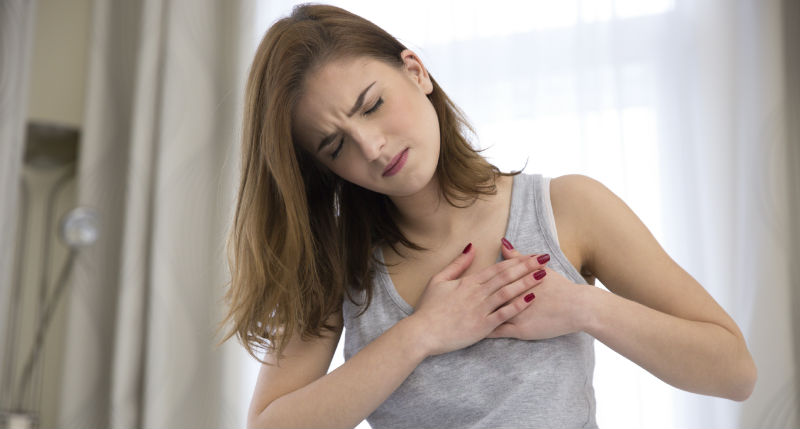Sore nipples are very common, especially if you’re ovulating or breastfeeding. However, just as with most reproductive health issues, many women feel bashful about discussing them openly.
What you need to know, however, is that there is nothing to be embarrassed about. Nipples are highly sensitive areas, and as such, are easily irritated.
5 Home Remedies for Sore Nipples
1. Aloe Vera
Fresh Aloe vera delivers soothing relief and natural healing for sore nipples. Rub some clear gel from the inside of an aloe leaf onto the affected area and allow it to air dry. The cooling relief starts almost immediately.
2. Coconut Oil
Coconut oil is great for soothing your skin. Apply a small amount to nipples in a gentle massage. It can bring relief to sore, cracked or itchy nipples. It’s also a moisturizing agent, so it’s particularly welcoming if you’re breastfeeding.
3. Basil Leaves
Grind up some leaves into a paste, and apply to the nipples, then allow to air dry. Before breastfeeding your little one, remember to wash off the paste.
4. Witch Hazel
Applying witch hazel to your nipples will help reduce inflammation, and eliminate itching.
5. Cold and Warm therapy
Applying ice (wrapped in a towel) for a few minutes will help reduce any swelling in the area, while applying a heat pack promotes healing. Just make sure not to apply heat directly to the skin.
Natural Nipple Soreness Treatment for Nursing Moms
For the nursing mother, just applying a few drops of your own breast milk to the nipple before breastfeeding will provide healing. Breast milk is known to contain antibacterial properties. After breastfeeding, apply more milk to your affected nipple and allow it to air dry.
7 Sore Nipple Symptoms
Every woman is different, so it’s possible that you may not experience every symptom, but you might experience some of the following symptoms:
- Mild soreness
- Breast pain
- Tenderness
- Swelling
- Nipples or breasts feel heavy
- Itchiness
- Discharge from nipples
These issues do not need to send anyone into panic mode, but if you are curious about more information or are starting to worry, please contact a medical professional.
10 Causes of Sore Nipples
There are many reasons for experiencing sore nipples. Some of the most common reasons include the following:
1. Ovulation. When you’re ovulating, the levels of estrogen and progesterone in your body fluctuate: Estrogen causes breasts to enlarge, while progesterone causes milk ducts to engorge. This causes the nipples to become very tender and sore. It usually occurs about a week to ten days before your period.
2. Menstruation. Just as when you’re ovulating, estrogen levels change, causing reactions while you’re on your period: bloating, mood swings, breast pain, and nipple soreness. Sometimes the breast tissue around the nipple will look lumpy.
3. Pregnancy. Sore nipples during pregnancy are due to a rise in estrogen. This hormone promotes breast growth for the production of milk. In addition, while your body prepares to deliver your baby, you receive additional blood flow to your breasts. The combination of both factors often results in sore nipples.
4. Breastfeeding. Newborns need constant feeding, and the constant latching onto your breasts eventually stretches tissue in the areola. As a result, you may experience tenderness, chafing, pain, and soreness in your nipples.
5. Mastitis. Mastitis is an inflammation of breast tissue. It can be caused by bacteria entering your system through cracked skin. It’s often experienced by women who are lactating. Another common cause is a blocked milk duct, which occurs when a breast isn’t completely emptied during a feeding.
6. Eczema. Certain chemicals found in soaps or laundry detergent can cause irritation to the skin. If irritation occurs in the areolas, the nipples can become itchy and sore.
7. Menopause. The same way an increase in estrogen and progesterone cause nipple soreness during ovulation and menstruation, a decrease in these hormones also results in breast pain and tenderness. This is especially so during menopause, when the fluctuation is so drastic. In addition to soreness, you may feel a burning or throbbing sensation around the nipples.
8. Paget’s Disease of the nipple. This condition occurs when cancer cells collect in the tissue surrounding the nipples. In addition to soreness, the nipple becomes itchy, red, scaly, and irritated. It’s usually diagnosed in women in their 50s or 60s.
9. Yeast infection of the nipples. Yeast infections are skin infections. While it is commonly known to occur in the vagina, it can also happen on nipples. This is common when a woman is breastfeeding, since the baby can pass thrush through their mouth into the nipples. This type of yeast thrives on breast milk.
10. Running long distances. Sometimes, nipple soreness doesn’t have anything to do with your reproductive health. If you’re a new runner, it’s essential to wear a good sports bra that fits well and is specifically designed for high-impact activity. A regular bra can allow your breasts to bounce around while you run, causing friction with the material you’re wearing. You can also apply Body Glide around your sports bra line to avoid chafing and irritation.
Call OB-GYN Women’s Centre of Lakewood Ranch Today
Our highly skilled and compassionate doctors offer support with kindness. Sore nipples are a common occurrence. If you would like more information about tender breasts or have general gynecological inquiries, please contact OB-GYN Women’s Centre of Lakewood Ranch today. Let us advise you further.


